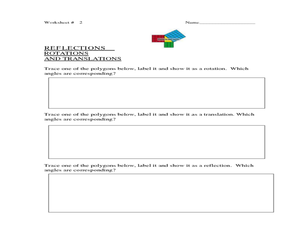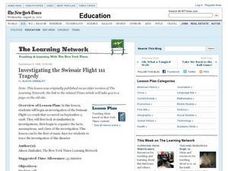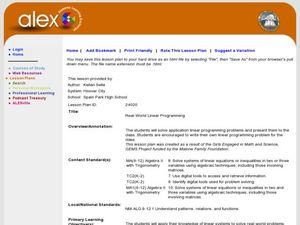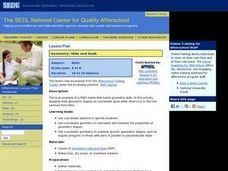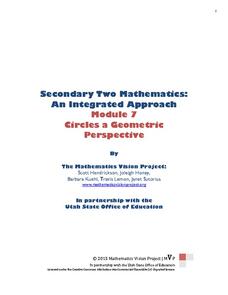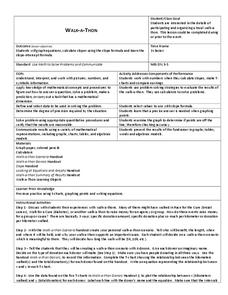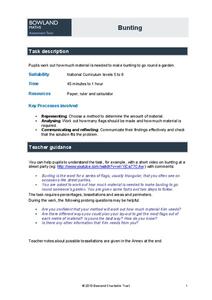Curated OER
Science: Invent a Gadget
Third graders invent gadgets using simple machine principles. Once they have assembled graphic organizers containing information about their invention, they draw diagrams and explain how their gadget works. Lastly, 3rd graders write...
Curated OER
Graphs, Stories, And Games
In this graphs lesson, learners read stories and present story situations on a graph. They explore distance and diameter and explain graphs. Students create their own stories to fit graphs.
Curated OER
Deep Thoughts
Students examine what lies within the Earth. They research and create scale models illustrating the layers of the Earth and write skits advocating a travel plan to send a probe into the Earth's mantle.
Curated OER
Lesson Exchange: Kite Construction (Elementary, Science)
Students learn the technology of kite making and how to make a kite and fly a kite.
EngageNY
Complex Numbers and Transformations
Your learners combine their knowledge of real and imaginary numbers and matrices in an activity containing thirty lessons, two assessments (mid-module and end module), and their corresponding rubrics. Centered on complex numbers and...
Curated OER
Point Comparisons
Young geometers investigate two-dimensional figures using coordinate grids. They identify polygons and draw examples of their reflection, rotation, and translation on a coordinate grid. And they complete a worksheet practicing examples...
Curated OER
Investigating the Swissair Flight 111 Tragedy
Middle schoolers read two articles about the same event: "Plane from J.F.K Crashes off Canada" from the New York Times and "No Survivors from Crash of Swissair Jetliner Off Nova Scotia" from the Associated Press. They then compare the...
Curated OER
Real-World Linear Programming
Explore linear programming on a website game. Partners solve a real-world problem by setting up an objective function and a linear inequality. They graph their results on chart paper and also using a calculator before presenting their...
Curated OER
Tennis Balls in a Can
Make your classroom interesting by teaching or assessing through tasks. Deepen the understanding of Geometry and motivate young mathematicians. The task uses investigation with tennis balls and their container to prompt learners to use...
Curated OER
Magnetic Fields, Magnetic Forces, and Electromagnetic Induction Sample Problems
After high schoolers have learned about electromagnetic induction, they can solve these 10 practice problems. They calculate magnetic field strength, magnetic force, electromotive force, and output voltage. This is a choice option as a...
Physics Classroom
All Work and No Play Lab
Don't let the term, "slotted wood board" detract you from the value of this experiment. Class members tie a string to a cart and, with even horizontal force, drag it up an inclined plane. The objective is to compare the work done with...
Kenan Fellows
Weight and Balance of an Airplane
A career in aeronautics might be calling your class members. Building from the previous two lessons in the series, learners continue analyzing the mathematics of aeronautics. Groups create a paper airplane using paperclips for balance....
PBS
Geometry: Hide and Seek
A geometry game that resembles Battleship is the foundation for hide and seek where "hiders" draw shapes on coordinate planes and "seekers" must guess the shape and its location based on questions and clues. Reproducible, paper-sized...
Mathematics Vision Project
Circles: A Geometric Perspective
Circles are the foundation of many geometric concepts and extensions - a point that is thoroughly driven home in this extensive unit. Fundamental properties of circles are investigated (including sector area, angle measure, and...
Exploratorium
Stripped Down Motor
Mostly for teacher's use, here are instructions for making a traditional electromagnetic motor and a detailed explanation of how it works.
Curated OER
Branding Circles, Squares, Rectangles, Triangles
Compare and classify 2-D shapes! Kindergarteners inspect the attributes of plane shapes and examine shapes in everyday life. They label the circles, squares, rectangles, and triangles they find. This is the website where you can find the...
EngageNY
Mid-Module Assessment Task - Algebra 2 (Module 1)
Challenge classes to think deeply and apply their understanding of polynomials. The assessment prompts learners to use polynomial functions to model different situations and use them to make predictions and conclusions.
Curated OER
Mining Shapes
In this 2-D shapes lesson, kindergarteners review plane shapes attributes. They engage in a shape hunt in the classroom and create art using plane shapes. A good, hands-on lesson!
University of Colorado
Spacecraft Speed
Space shuttles traveled around Earth at a speed of 17,500 miles per hour, way faster than trains, planes, or automobiles travel! In the 13th installment of 22, groups graph different speeds to show how quickly spacecraft move through...
Curated OER
Chopping Cubes
Middle schoolers work in small groups to make various geometric solids with Play-Doh. They use fishing line to make cuts and observe the shapes of the cross-sections. Pupils complete an assessment in which they answer questions such as:...
Alabama Learning Exchange
Bloodstain Pattern Doesn't Lie......
An interesting instructional activity on hypothesizing about the diameter of a drop of blood that is splattered. To test their theories, learners work in groups to make blood droplets splatter from different heights. They use graphed...
Curated OER
Walk-A-Thon
Students graph linear http://www.instructional activityplanet.com/review?id=180542equations. In this problem solving instructional activity, students calculate slope and plot ordered pairs on a coordinate grid. Using a real-life example...
Bowland
Bunting
How much fabric is necessary for bunting? Scholars use given dimensions of triangular bunting (hanging decorations) to determine the amount of fabric necessary to decorate a rectangular garden. The task requires pupils to consider how...
Noyce Foundation
Photographs
Scaling needs to be picture perfect. Pupils use proportional reasoning to find the missing dimension of a photo. Class members determine the sizes of paper needed for two configurations of pictures in the short assessment task.







